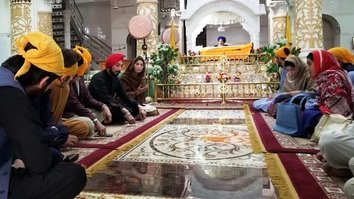ISLAMABAD -- Observers of Pakistan's emergence from more than a decade of terrorism and violence are calling on religious scholars and educators to help change the mentality of intolerance.
Pakistan has endured horrific terrorist attacks, including the slaughter of more than 150 children and teachers at the Army Public School in Peshawar in December 2014.
In response to growing insecurity, the government launched a number of military offensives, intelligence-based operations and police crackdowns, including Operation Zarb-e-Azb (launched in June 2014), the counter-terrorism National Action Plan of January 2015 and Operation Radd-ul-Fasaad (beginning in February 2017).
Promoting compassion and tolerance
These steps have made the country much safer than in years past, but progress will not be permanent until the country changes its mentality, say analysts such as Lahore-based political scientist Prof. Hassan Askari Rizvi.
Religious intolerance has caused "irreparable damage to Pakistan's social fabric", he told Pakistan Forward, referring to the attitudes that cause mobs to lynch individuals accused of blasphemy or individuals who dupe youths into joining terrorist groups.
"Youth are especially vulnerable to the growing radical ideology," he said. "It ... demands loyalty to a trans-national entity that replaces notions of citizenship."
Radicalism has "given rise to a culture of defiance leading to societal anarchy", he said.
Pakistanis need to find an alternative paradigm, one that harks back to the founders' original vision for the country, Rizvi said.
"We need to propagate the intellectual and compassionate side of Islam," he said.
Religious scholars, government must take action
Scholars should be fighting the creeping intolerance by "highlighting commonalities among different faiths and by developing an understanding of modern citizenship, which is compatible with tolerance, fairness and harmony", Rizvi said.
Educators should be striving to make terrorist misinterpretations of Islam "unacceptable to people", he said, calling for the promotion of religious diversity as a fundamental value.
Pakistan is about 95% Muslim, with about one-tenth of the Muslims being Shia, according to government statistics.
To achieve a growth in tolerance, the "provincial and federal governments should pay special attention to eliminating the class divide, reforming justice, improving governance, distributing natural resources justly, finding more natural resources and addressing population pressure", Rizvi said.
The political parties have platforms discussing those problems, but "it's important for parties ruling in the provinces and in the centre to take the necessary steps", he said.
Key to defeating the militants will be relying on the guidance of the constitution, he said, citing its provision of equal rights for all Pakistani citizens and its prohibition of private armies or militias.
Countering militants' toxic ideology
Scholars and experts who came together at a seminar in Islamabad March 20 agreed on the country's need for more tolerance in order to defeat terrorism for the long term.
The Islamabad-based think tank Pak Institute for Peace Studies (PIPS) organised the seminar, attended by 15 religious scholars and social scientists.
The conferees agreed on the need to separate militants from the population whom they wish to deceive. To do so, Pakistan needs to challenge militants in the realm of ideas, they said. Giving Islamic scholars a voice through education and media will counter militants' toxic views, they added.
One idea was to form national and provincial dialogue forums, such as think tanks and media houses, and to build up existing area study centres at universities so that Pakistanis can learn more about other faiths and sects.
For too long, authorities and educators have not challenged the extremists' claim to be defending or upholding religion, according to forum participants.
Education essential for tolerance, peace
"Education remains the key," Syed Jaffar Ahmed, former chairman of the University of Karachi Area Study Centre, said in his speech at the conference. "To de-radicalise society, we need to redesign the national curriculum, particularly social sciences."
The government "must partner with not only religious scholars but also religious intellectuals" to produce a curriculum that "reduces [extremist] rhetoric, develops critical thinking and promotes the religious values of tolerance, compassion and respect for diversity", he said.
"Faith-based peace building emphasises the role of religion in conflict prevention and conflict resolution," cleric Raghib Naeemi of Lahore told Pakistan Forward.
"Religion has been used and misused throughout history to mobilise people," he said. "We must nurture faith-based peace building in Pakistan to reduce radicalism in the long term."

![Pakistani counter-terrorism specialists participate in a discussion organised by the Pak Institute for Peace Studies in Islamabad March 20. [Amna Nasir Jamal]](/cnmi_pf/images/2017/05/18/7916-amna-585_329.jpg)






